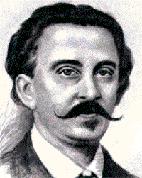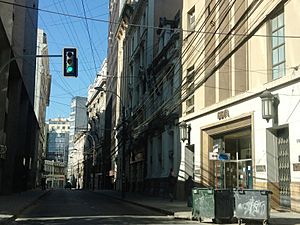Segundo Ruiz Belvis facts for kids
Quick facts for kids
Segundo Ruiz Belvis
|
|
|---|---|
 |
|
| Born | 13 May 1829 |
| Died | 3 November 1867 (aged 38) |
| Occupation | Abolitionist |
| Notes | |
|
Ruiz Belvis helped plan an armed expedition to Puerto Rico in what was to become known as the "Grito de Lares".
|
|
Segundo Ruiz Belvis (born May 13, 1829 – died November 3, 1867) was an important figure from Puerto Rico. He was a strong voice against slavery and also worked hard for Puerto Rico to become an independent country.
Contents
Early Life and Education
Segundo Ruiz Belvis was born in a town called Hormigueros, Puerto Rico. Back then, Hormigueros was part of Mayagüez. His parents were José Antonio Ruiz and Manuela Belvis.
He started his schooling in Aguadilla. Later, he traveled to Venezuela and earned a degree in philosophy from the University of Caracas. He then went to Spain and studied law at the Central University of Madrid. While in Spain, he met many people who believed in freedom and wanted to end slavery. These friendships helped shape his ideas.
Fighting Against Slavery
In 1859, Ruiz Belvis returned to Puerto Rico. There, he became good friends with Ramón Emeterio Betances. Together, they joined a group called "The Secret Abolitionist Society." This group worked to free enslaved people.
- One special way they helped was by baptizing and freeing thousands of enslaved Black children. This event was known as "aguas de libertad," which means "waters of liberty." It happened at the Cathedral of Mayagüez.
Ruiz Belvis later moved to Mayagüez and started his own law practice. The people of the city chose him to be a Justice of the Peace. This meant he helped solve small legal problems. He was also appointed to the Mayagüez city council. In this role, he looked after the well-being of enslaved people in his area and managed public money. He became very active in politics and made ending slavery his main goal.
Advocating for Freedom in Spain
In 1865, Ruiz Belvis went back to Madrid, Spain. He spoke to the Cortes Generales, which was like the Spanish parliament, about ending slavery. Even though the Spanish rulers thought his ideas were dangerous, his efforts helped start a movement. This movement eventually led to the freedom of enslaved people in the remaining Spanish colonies in Latin America.
In 1866, after his father passed away, Ruiz Belvis inherited his family's farm, called Josefa. The very first thing he did was free all the enslaved people who worked there. This showed how deeply he believed in freedom.
Working for Puerto Rican Independence
When Ruiz Belvis returned to Puerto Rico, he found that the Spanish governor, José María Marchesi Oleaga, did not like his ideas about freedom. Because of this, Ruiz Belvis and his friends were forced to leave the island.
In 1866, Ruiz Belvis ended up in New York. There, he joined Betances and other patriots to form the "Comité Revolucionario de Puerto Rico" (the Revolutionary Committee of Puerto Rico). Their goal was to gain independence for Puerto Rico. They planned to send an armed group to Puerto Rico, which became known as the "Grito de Lares" (Cry of Lares).
During this time, Ruiz Belvis became very ill. Despite his sickness, he traveled to Valparaíso, Chile, to raise money for the planned revolution.
Segundo Ruiz Belvis passed away in Valparaíso on November 3, 1867, from a serious infection. He died before the "Grito de Lares" uprising happened the next year. The uprising did not succeed, but slavery was finally ended in Puerto Rico on March 22, 1873. Ruiz Belvis is buried in the chapel of the Cemetery of Hormigueros.
Legacy and Remembrance
To honor Segundo Ruiz Belvis, many streets in Puerto Rico are named after him. Schools in his hometown of Hormigueros, as well as in Ponce and Santurce, are also named in his memory.
In the United States, there is a "Segundo Ruiz Belvis Cultural Center" in Chicago, Illinois. Also, the "Segundo Ruiz Belvis Diagnostic and Treatment Center" in the Bronx, New York, is named after him. These places help keep his memory alive and remind people of his fight for freedom and justice.
See also
 In Spanish: Segundo Ruiz Belvís para niños
In Spanish: Segundo Ruiz Belvís para niños


